Apr
Gillian Welch and David Rawlings, and the Covers of Many Colors
in Music

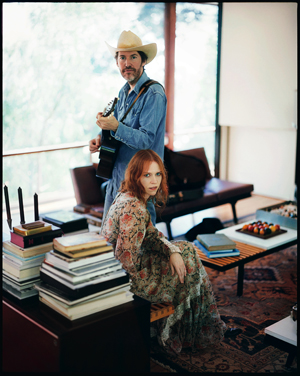
We confess to being infatuated with artists’ covers of others’ songs. And sometimes when you take the best artists from two dissimilar genres, magic can truly ensue.
Check out Gillian’s and David’s folk-ish cover of Radiohead’s great rock song, Black Star, in which Welch and Rawlings take a great song and make it greater (though admittedly, in a dramatically different way). Welch seems to deliver the song with an acknowledgment that this world isn’t always a perfect place (and is oft-times imperfect). The truth sometimes hurts, but it’s good to know you’re in good company, and to move forward with eyes wide open. Check out a live video of that cover below. And below that is another version for the astronomically inclined.
And then listen in to a stunningly rendered cover by David Rawlings Machine (with Welch) of Bright Eye’s Method Acting that segues into Neil Young’s Cortez the Killer from a Daytrotter session that you can listen to and/or download here.
We know it unlikely, but if you aren’t familiar with Daytrotter, then you are missing some great music and should check it out frequently here. Daytrotter is that fine outfit that each day brings in artists, records their sessions, adds some frequently well-done illustrations and narrative of the performers and their songs, and then makes all of it available to the general public for streaming/download. Very well done.
Apr
The Baseball Project at the Mercury Lounge
in Music
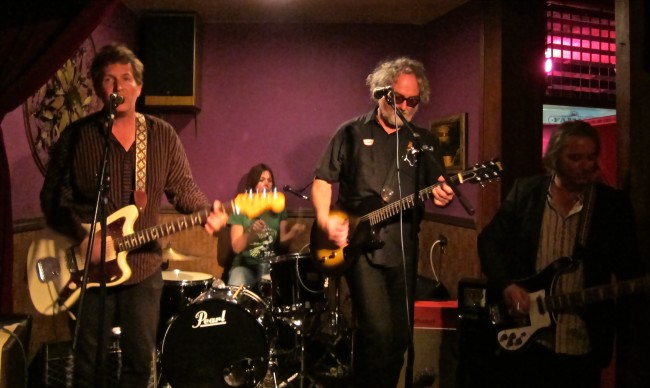
The Baseball Project (Steve Wynn, Scott McCaughey, Linda Pitmon and Peter Buck) came to Goleta on April Fool’s Day, but there were no fools at the Mercury Lounge. All the fools were elsewhere, and missed a great evening of rock n’ roll. The band knocked the proverbial cover off of the ole ball last Friday in support of their new record, “Volume 2: High and Inside.” The combination of these three fresh fellows and drummer queen, with the homey surroundings of the Mercury Lounge was a phenomenally winning rotation. Well played Club Mercy; well played.
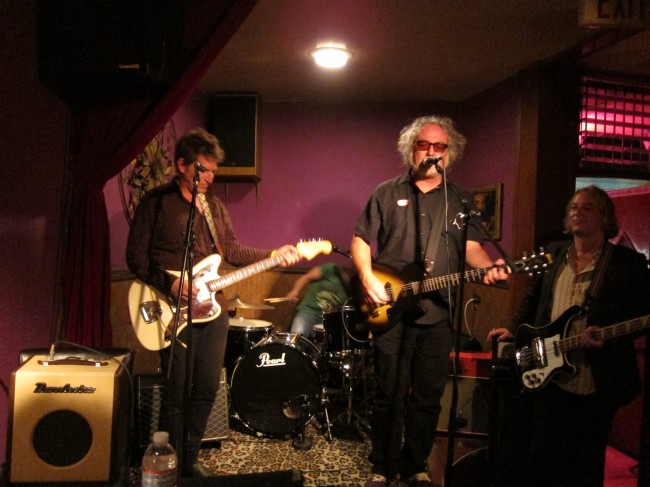
We arrived early and were practically welcomed personally by the band members, all of whom were ultra pleasant and approachable. They obviously enjoy meeting and hanging with their ardent fans and were open to all who cared to chat. It was a very refreshing scene absent of any prima donnas (or dons).
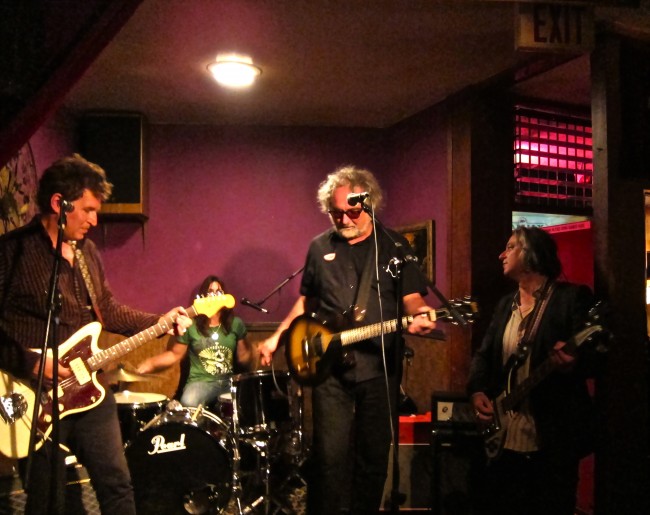
Make no mistake, this is not dramatically innovative music. But as they have shown since their first record, “Volume One: Frozen Ropes and Dying Quails,” they write great melodies and bridges aplenty, and the compositions were delivered with verve at the Mercury. Put simply, the band rocked the Merc hard. Wynn (Dream Syndicate, Dusty and Danny, Minus 3), McCaughey (Young Fresh Fellows, Minus 5), Pitmon (Golden Smog, Miracle 3) and Buck (some obscure band I can’t recall) play straight-ahead rock n’ roll, with all of the songs telling touching stories of various players in the game of baseball (including the athletes). They obviously love the sport and have interesting and well-wrought vantages on those that they cover, including Bill Buckner, Tim Lincecum (the Freak), Curt Flood, Willie Mays, Sandy Koufax, Roger Clemens, and Mark McGwire, amongst others. And all four are great instrumentalists/singers who play well with and off of each other.
Wynn and McCaughey were on guitar duty. Utility player, Buck, played bass throughout except for a song or two on which he traded out for some nicely-rendered Rickenbacker. But the musician of the evening was Pitmon. She is simply one of the better drummers we have ever had the pleasure of seeing live. Though capable of flash and power, she is a subtle drummer who plays to the songs perfectly and was mesmerizing throughout the evening. Steve Wynn has previously provided this very apt description of her drumming: “she’s also really a songwriter’s drummer. She doesn’t just play to show off, she’s not playing with blinders on. She’s hearing the songs, she’s hearing the lyrics, she’s commenting on things in the lyrics, and I think because she plays that way, it makes me a better songwriter. She’s punctuating what I’m doing. And she has a really good sense of the band as a whole. She’s flashy and at the same time she’s a utility infielder. She’s playing whatever role needs to be played to make the whole thing work.”
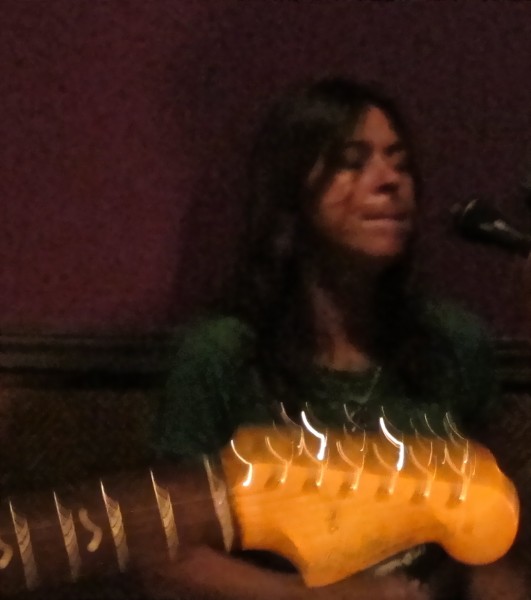
Wynn and McCaughey delivered the goods on guitar throughout and Buck held down the bottom end while leaning against a post most of the evening, checking out the audience and looking over to admire/visually-cue the other members.
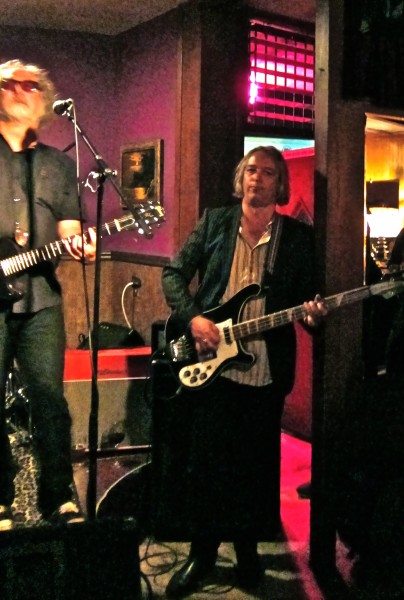
Robert Lloyd (not Richard Lloyd from the band Television, the band pointed out and proferred a few of that fine band’s licks) joined at the Mercury Lounge on keyboards and added some nice touches. But even he was so taken by the proceedings that he had to stop and take some photos.

It was the first time we had seen Steve Wynn since catching his seminal and incendiary psych-rock band, Dream Syndicate (on their “Days of Wine and Roses” tour in a club in San Diego circa 1982). We hope it won’t be the last time he comes to Santa Barbara. We have loved and highly recommend his solo records (more on those another time), including brand new album, “Northern Aggression” (with the Miracle 3).
The next time this band or any of its constituents come to town, don’t be a fool (April or otherwise). Get a ticket and come on out to the ballgame.
You can read Steve Wynn’s great Diary, including a couple of paragraphs about the Santa Barbara stop, here.
For a taste of The Baseball Project, check out a couple videos below.
Apr
I’ve Been From Here to Kinsley, Kansas–Freedy Johnston
in Music
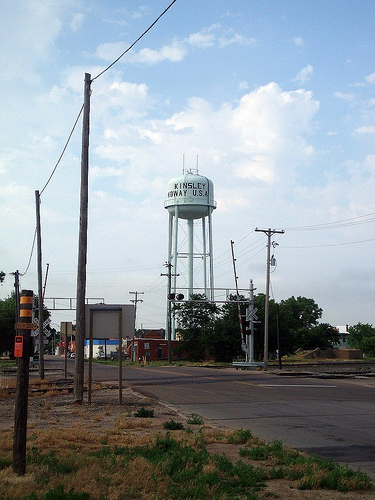
We’ve hung around a few small Kansas towns in our lives. Concordia. Beloit. Belleville (sans les Triplettes). Freedy Johnston came from Kinsley, Kansas. There seem to be but two kinds of kids in these types of towns: those that can’t imagine leaving their beloved ten-cent-towns, and those who crave kinetic trains or stolen cars to quickly carry them away. Freedy Johnston was that second kid, and the musical world is far better for it.
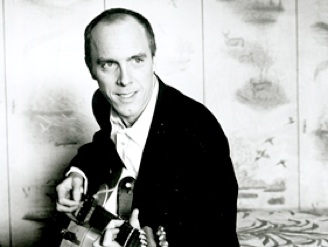
Freedy left Kinsley and stepped on the Lawrence, Kansas* stone before Telecastering out to New York City in 1985. After rambling around the NYC boroughs for a bit, he signed to Bar/None and released a few tracks and then his first proper record in 1990. Freedy then dropped the songwriting bomb in 1992 with his ravishing record, “Can You Fly,” which received universal praise and was named one of the year’s best albums by The New York Times and other smarty-pants outfits. One of our heroes, Robert Christgau (then of the Village Voice), called it “a perfect album.” To this day the songs on Can You Fly hit us in the heart and head with their heartland headaches and hearty helpings of woe and growing pain.
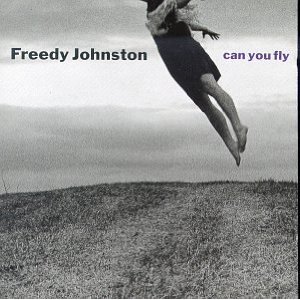
Freedy was so devoted to departure and the musical muse that he sold his family’s Kansas farm to finance the recording of Can You Fly, all of which is described and lamented on the opening song (Trying to Tell You I Don’t Know) and on several other songs on the album. As you can imagine, there was a tinge of guilt involved in the cavernous cost of pursuing success.
After the bombshell of Can You Fly, Freedy was signed by Elektra Records and next released “This Perfect World” in 1994. This Perfect World was just that: perfect. This Perfect World was (and still is) praised as one of the best albums of all-time. The album was produced by veteran Butch Vig, and included stints from great players such as Marshall Crenshaw, Marc Ribot, Kevin Salem, and Graham Maby. In conjunction with its release, Freedy was rewarded with a minor hit single with “Bad Reputation”* off of This Perfect World.
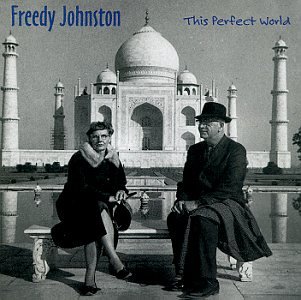
After the hallowed heights of these two all-time records, Johnston’s output and career have roller-coastered over the years between the sublime and the ridiculous. He has released some great albums and songs over the years (most recently, last year’s critically-acclaimed “Rain On The City” album), and understandably enjoys a loyal fan following.
Freedy’s masterful songs mediate musically between the raucous and the refined, with terse lyrical tales coated with carefully and concisely wrought character-studies. It’s a benevolent blend that has stood the test of time. Check out some of his songs below from his two best albums, and if you haven’t heard before, join with those that know and revere this great songwriter.
Freedy Johnston–Mortician’s Daughter
[audio:https://www.thelefortreport.com/blog/wp-content/uploads/09-The-Morticians-Daughter.mp3|titles=09 The Mortician’s Daughter]
Having spent scads of our early youth stamping tombstones in our grandfather’s monument shop, and having fallen for a few (Kansan and non-Kansan) lasses along the way, this song always takes us back and tears us asunder. In our humble opinion this is one of the best songs ever written. Freedy sings of a lost-love who has passed on (perhaps from the planet, which makes the repeated lines, “Her father stands in the open door, he’s waiting for her,” that much more poignant). And when that Telecaster roils across that lake from 1:59-2:20, it never fails to chill. One for the ages.
“I used to love the mortician’s daughter
We drew our hearts on the dusty coffin lids
I grieve tonight over this letter
My tears dissolve an image from the careful ink
Her father stands in the open door
He’s waiting for her
There’s a storm blowing across the lake
It’s late summer
On the broken step is a cardboard box full of wilted flowers
She whispers in my burning ear
It doesn’t matter
I used to love the mortician’s daughter
We rolled in the warm grass by the bone yard fence
Her skin so white
The first leaves falling
This long forgotten night I am there again
Her father stands in the open door
He’s waiting for her
There’s a ribbon printed with last respects
Blowing down the gutter
The rain comes in she drops my hand
She’s turning laughing
And I used to love the mortician’s daughter
I used to love the mortician’s daughter
We drew our hearts on the dusty coffin lids
There’s a lonely dove out on the telephone wire
I turn my head and she flies away.”
Freedy Johnston–Trying to Tell You I Don’t Know
[audio:https://www.thelefortreport.com/blog/wp-content/uploads/01-Trying-to-Tell-You-I-Dont-Know.mp3|titles=01 Trying to Tell You I Don’t Know]
This is the unabashed rocker previously alluded to in which Freedy sells regret for selling the family farm. Sold the map up to the sky?? Sheer poetry in that sadness. The first stanza is “pert near” perfect, and the red light (recording studio) line speaks volumes:
“Well I sold the dirt to feed the band
Falling right through my hands
Yes I sold the map up to the sky
Falling down always try
Trying to wake up in your head (drive away, drive away)
Trying to cry with the red light on (drive away, drive away)
Trying to tell you I don’t know
Well I sold the dirt and bought the road
Let me tell you right where we’re going
Yes I sold the house where I learned to walk
Falling down always try
Fifty bucks to use the van
Trying to find your city, man
Trying to get back my guitars
Trying to tell you I don’t know
Well I sold the dirt for a song
Bleeding on every note
Yeah, I sold the map up to the sky
Falling down, always try
Trying to sing what I can’t say
Trying to throw my head away
Trying to cry with the red light on
Trying to tell you I don’t know”
Freedy Johnston–Can You Fly
[audio:https://www.thelefortreport.com/blog/wp-content/uploads/07-Can-You-Fly1.mp3|titles=07 Can You Fly]
We love the languid musical feel of Can You Fly and the magical realism of the lyrics. Who can figure the meaning? Is it a tornado vision, a fever dream, a prophet alighting? The cover photo speaks of a yearning to leave gravity’s pull. If it wasn’t so torpid, it might be a high-jumper’s perfect headphone psych-up.
Freedy Johnston–Responsible
[audio:https://www.thelefortreport.com/blog/wp-content/uploads/08-Responsible.mp3|titles=08 Responsible]
In Responsible Freedy captures well a father’s alternating woe and resentment as his daughter leaves the nest for the big city (“she has gone to New York City, through that arch [St. Louis] on a summer night”). The music has a loping groove that is infectious, and the slide guitar touches are tastefully impeccable. We love the stanza below and the false-finish at 4:19. And these seemingly spiteful lines never fail to take us aback: “Goodnight my dear, goodnight my cold little one, has your dream begun?”
“It’s raining blossoms down in the concrete park
A girl walks in and out of the evening shade
A broken angel weeps through her spraypaint smile
No tears can reach me while I know I’m not responsible”
Freedy Johnston–Down in Love
[audio:https://www.thelefortreport.com/blog/wp-content/uploads/11-Down-in-Love.mp3|titles=11 Down in Love]
Down in Love is a perfect duet between the talented Syd Straw and Freedy. We love this love-stained stanza in particular:
“The day breaks down and cries a river
It soaks me to my heart
Down in love I know they’re laughing
Tearing us apart
No more dreams for me.”
Freedy Johnston–Bad Reputation
[audio:https://www.thelefortreport.com/blog/wp-content/uploads/01-Bad-Reputation2.mp3|titles=01 Bad Reputation]
In Freedy’s mid-tempo hit rocker, Bad Reputation, we hear the artist’s honest self-assessment and a hope-beyond-hope that a mistreated lover might be foolish enough to take him back.
“I know I’ve got a bad reputation
And it isn’t just talk, talk, talk
If I could only give you everything
You know I haven’t got”
Freedy Johnston–This Perfect World
[audio:https://www.thelefortreport.com/blog/wp-content/uploads/04-This-Perfect-World1.mp3|titles=04 This Perfect World]
This Perfect World can do no wrong in our musical songbook. Musically, the acoustic guitar, electric jangle and cello are a perfect meld in support of Freedy’s expressive vocals. Lyrically, the song falls somewhere between Raymond Carver and Raymond Chandler, and in a scant 4:34 Freedy eloquently embodies a father speaking his last words to his daughter after the death (murder, suicide?) of her mother. It’s a harrowing tale with a clearly sarcastic title. Short story soundtrack and tour de force. It was also featured in the movie, Kingpin.
“You oughta see your face
You oughta hear your voice
Last time I was here I wouldn’t turn around
You oughta lock that door
Somebody might get in
Didn’t I teach you that
This perfect world
So blue I can’t begin to say
This perfect world
I know I never should have gone away
But I still deserve to say goodbye no matter what I’ve done
No matter what I’ve done
I see her in your face
Hear her in your voice
Last time I was here they’d found her in the lake
You oughta see my scar
You think I’m made of stone
Didn’t you tell me that?
This perfect world
So blue I can’t begin to say
This perfect world
They say that soon I will be gone away
But I still deserve to say goodbye no matter what I’ve done
No matter what I’ve done
This perfect world
This perfect world
Now I’ve come around it’s far too late
And these pills won’t even let me cry
No one knows you even when you’re gone
But I still deserve to say goodbye no matter what I’ve done
No matter what I’ve done
You oughta see your face
You oughta hear your voice
Lock this after me”
Freedy Johnston–Gone Like The Water
[audio:https://www.thelefortreport.com/blog/wp-content/uploads/08-Gone-Like-The-Water1.mp3|titles=08 Gone Like The Water]
Gone Like the Water is Freedy’s early-career autobiography. The song is his most country-influenced, which frames his homesickness well. The harmonies are dulcet throughout, and the spare electric guitar adds just the right touches.
“An old suitcase she’ll never miss
Leather coat he used to wear
Thinking tough, looking tired
With Mama’s money and Daddy’s ring
He’s gone like the water down to NYC
Sleeping on the 8-0-2 along this river, running down
He’s gone like the water down the depot drain
Disappearing in the city
Twenty-four and going pale
Growing out
Cutting back
Drew a face on a ticket stub
With Mama’s hand and Daddy’s pen
He’s gone like the water down to NYC
Sleeping on the 8-0-2 along this river, running down
He’s gone like the water down the depot drain
Disappearing in the city
Talk all night, cook all day
Looking for a new place to stay
Thinking hard, looking bad
With Mama’s dollar in Daddy’s coat
He’s gone like the water down to NYC
Sleeping on the 8-0-2 along this river, running down
He’s gone like the water down the depot drain
Disappearing in the city”
Freedy Johnston–Evie’s Garden
[audio:https://www.thelefortreport.com/blog/wp-content/uploads/10-Evies-Garden1.mp3|titles=10 Evie’s Garden]
We’re not sure what this song is about (Evie’s mental illness? Her having been abused?), but you don’t need a weatherman to know which way the wind blows on this one. It blows despairingly blue. Again, a cello and Freedy’s vocals fittingly fuse to frame the funereal blues and grays of the song. We like the following stanza in particular:
“Bring back the rain
We’ll go walking
Bring back the wind
Like you do”
Freedy Johnston–Wichita Lineman
[audio:https://www.thelefortreport.com/blog/wp-content/uploads/05-Wichita-Lineman.mp3|titles=05 Wichita Lineman]
Freedy is the Count of Covers, and nowhere is that better exhibited than on his cover of Jim Webb’s stellar song, Wichita Lineman (a huge hit for Glen Campbell back in the day). Glen’s version wasn’t bad, but we’ll take Freedy’s any day. The guitar makes it.
And for some completely gratuitous humor, please check out Craig Ferguson’s riff on Wichita Lineman below:
*As an aside, at a cafe on our last stop in Lawrence, Kansas, we asked an obvious music-type about Freedy’s time spent in Lawrence, and he pointed across the street to an upstairs window and said that was where Freedy had lived for a while; he also alluded to Freedy being a difficult personality and causing some trouble in those parts (hence the “Bad Reputation”). A prickly musical personality? Who knew?
Mar
Sufjan Stevens’ Seven Swans Reimagined
in Music

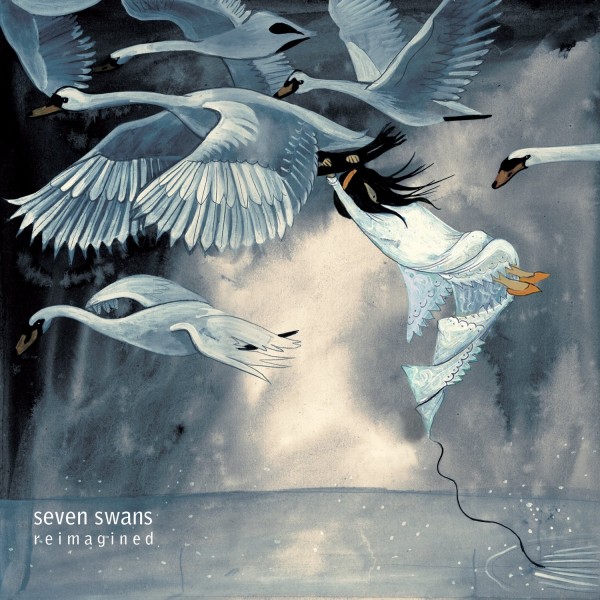
Some recordings can’t be improved upon. Others can. Check out this compilation, and let us know if you hear improvements over the originals in the new renderings.
A fine group of artists (including Bonnie “Prince” Billy, Joshua James, Half Handed Cloud) have been pulled together to record a re-worked rendition of Sufjan Stevens’ stellar record, “Seven Swans.” All profits from the album will go to benefit the Susan G. Komen For The Cure breast cancer foundation.
You can purchase and stream the record here. So far, we like Wakey!Wakey!’s edition of Size Too Small.
Mar
Sharon Van Etten, Encore
in Music

Regrets, we’ve had a few. Missing Sharon Van Etten’s show at the Detroit Bar in Costa Mesa (courtesy of Club Mercy) last Saturday is another grand omission.
We have written about Van Etten and her entrancing songs before. SXSW video vignettes are veering in from hither and yon, and below are three videos of Van Etten in Austin, including a new song (All I Can) off her next album (produced by The National’s Aaron Dessner) to be released some time later this year.
Van Etten’s song Don’t Do It (the last video below) still slays us. Let ’em in people, let ’em in.
http://www.youtube.com/watch?v=CoCWTjIcszc&feature=mfu_in_order&list=UL
http://www.youtube.com/watch?v=cemUgb7EVn4&feature=mfu_in_order&list=UL
http://www.youtube.com/watch?v=4_F2nGW0mYM&feature=mfu_in_order&list=UL
Mar
Songs Are Just Really Interesting Things To Be Doing With The Air
in Music

In case you missed it, check out the induction of Tom Waits into the Rock and Roll Hall of Fame, with Neil Young inducting, some classic Waits vignettes, Waits-ian acceptance speech, and great performances by the Man (including the marvelous Marc Ribot on guitar, featured prominently at the 11:00 mark).
All others need not apply.
http://www.youtube.com/watch?v=gVVDrPEQZt4&feature=player_embedded
Mar
Seryn–This is Where We Are
in Music

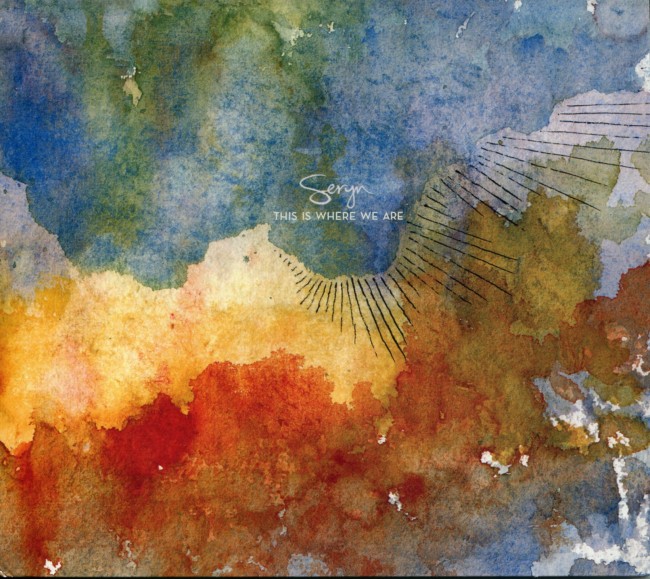
The Denton, Texas band, Seryn, has been receiving a lot of buzz in the bidnezz, including at this year’s SXSW music-fest in Austin. Check out their songs, We Will All Be Changed and River Song, and then videos of them performing the former and another song (Our Love) live. We Will All Be Changed in particular lives up to its title, and can change your day for the better. The band’s sound is part of the new group-vocal-chant trend (Fleet Foxes, Local Natives, Middle East, Lost in the Trees, Typhoon, et. al), that may get old long-term, but for now is still invigorating. But we hope Seryn’s songwriting and lyrics will continue to evolve so that we continue to care where they are.
Seryn–We Will All Be Changed
[audio:https://www.thelefortreport.com/blog/wp-content/uploads/04-We-Will-All-Be-Changed.mp3|titles=04-We-Will-All-Be-Changed]
Seryn–River Song
[audio:https://www.thelefortreport.com/blog/wp-content/uploads/25_Seryn_RiverSong.mp3|titles=25_Seryn_RiverSong]
Seryn – Our Love from WeDentonDoIt on Vimeo.
Mar
More Elbow Room
in Music

There’s a new Elbow record on the horizon and in the atmosphere (“build a rocket boys!”), and the word is that it is their best yet. Elbow exceeded all expectations last go-round with “The Seldom Scene Kid,” as we wrote about here. It is hard to believe that such seldom seen heights could be surpassed. We’ll defer to those that know best. The band will release “build a rocket boys!” on April 12th. In the meantime, check out a sweet glimpse below and then read a bit in Quietus about the new effort.
Mar
Read a Book or Two
in Books


We at Lefort have resolved to read at least two books per month. So far so good, but the year is young. The reading of books and novels seems to occur less frequently each year by the general populous, though we know many of you are the exceptions to that trend. If you need any book ideas, below is a “Consensus Cloud” graphic depicting the most frequently cited books from various “best of” sources (the larger the title in the graphic, the more frequently cited). You can read more about the graphic and its creation in the Guardian here.

Mar


